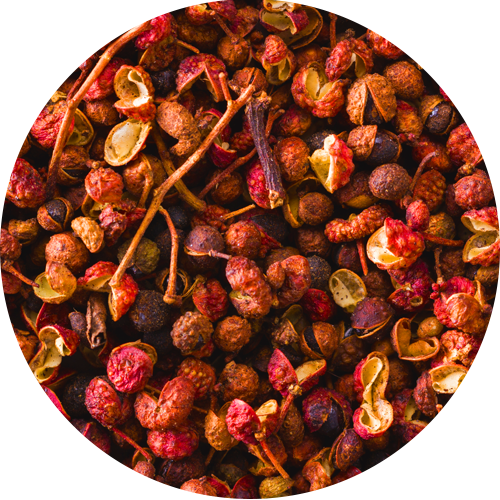Sichuan pepper is a thorny, aromatic, deciduous shrub that grows is Japan, the southern part of the Korean Peninsula and mainland China. It blooms between the months of April and May, forming clusters of greenish-yellow flowers measuring about 5 mm in size. It is dioecious, meaning that it has male and female species. The flowers of the male plant can be consumed as “hana-sanshō” (a luxury ingredient used to season meat and fish), while the female’s flowers produce berries or peppercorns about 5 mm in size.
Sichuan peppercorns are generally consumed in Asia as a spice; despite their name, they have no relation to black pepper. Even so, it is a spicy and very aromatic fruit, with hints of wood and lemon in the mouth. Sichuan pepper is widely used in Asian cuisine in the form of a roasted berry powder, as a finishing touch to a dish or in curries.
In perfumery, meanwhile, it has long been used to provide distinctive green, citrus and sometimes sweet notes to a wide range of fragrances. Sichuan pepper absolute, denser than oil and yellow-orange in color, is recognized as a fragrant extract with a spicy and citrusy aromatic profile. Its unique aroma combines spicy and citrus notes with a sweet touch similar to grapefruit, complemented by hints of vetiver and a subtle metallic nuance.
This versatile ingredient enhances and modifies the fresh and spicy aspects of fragrances, making it an ideal choice for top notes or as a foundational element in heart notes. It can be used in fragrances to intensify, invigorate, highlight and sometimes consistently modify the perfume.
The berries used in perfumery are hand-selected and must follow two steps to preserve their profile in order to be suitable for use. First, they must be dried in the sun or in a special warehouse. Then, they must undergo a complex extraction process called supercritical fluid extraction (SFE), which allows Sichuan pepper to maintain its own pure characteristics as a raw material.
Sichuan pepper extract SFE can interact on a massive scale in two fundamental ways: influencing top notes due to the high presence of terpenes in the pepper extract; and also interacting constantly with the heart notes thanks to its viscous nature. Both characteristics make it a valuable contributor to the stability and depth of the overall olfactory experience.
You can also find us on






